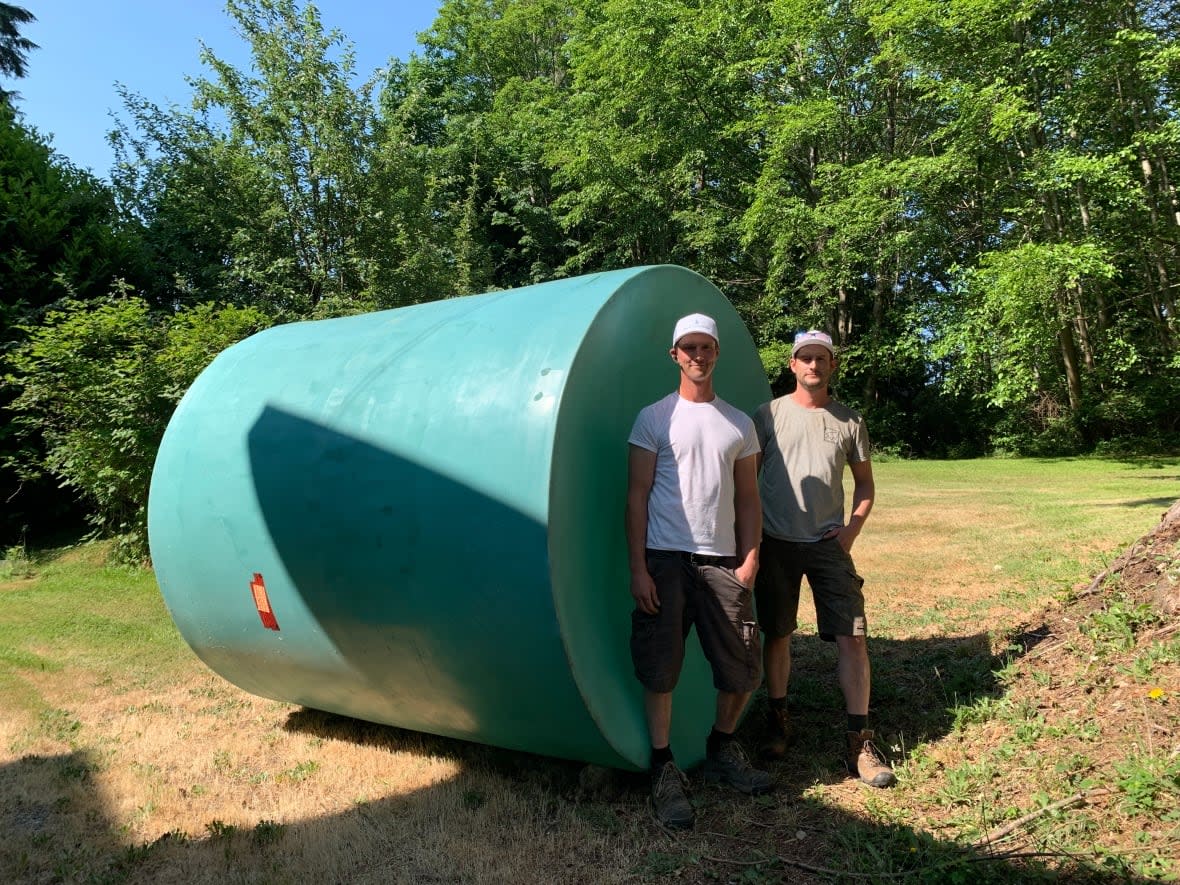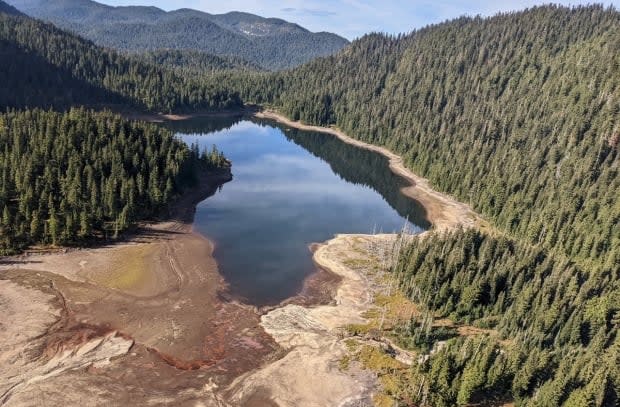Sunshine Coast stress on the rise as temperatures heat up, water shortage threat looms again

Sunshine Coast brothers Gord and Geoff Sloan wrestle a 9,000-litre water tank — the size of a small car — into position behind a rural Sechelt B.C., home until the empty metal cavern tips into place with a resounding boom.
The new owner of this massive metal tank hopes rain will fill it with enough to supply months of water for plants.
The brothers' year-old business, RainCatchers, is booming as more hot, dry weather arrives after a parched spring in a region dogged by drought for the past few years.
People are frustrated after two years of water restrictions — and no solution to the area's chronic droughts and fragile water supply, a growing problem in many parts of Canada.
"There certainly isn't enough water for people to keep their gardens. This client just has potted plants and she loves them. For what she's trying to do, this tank is probably overkill," Gord Sloan said.
"But you are never going to be upset if you have too much water."
Mayor urges faster action to offset drought
Water shortages in the Sunshine Coast district, located on the southern mainland coast of British Columbia, have people rushing to install rain collection systems and cash in on rebates of up to $1,000 offered by the region for installing rain storage tanks.
It's one of many efforts to offset drought. On May 1, the region put water restrictions in place. This month the mayor of the town of Gibsons, Silas White, sent a letter urging the province to take action to relieve drought anxiety.
"Our annual water restrictions have only just begun and many Coast residents are genuinely stressed by the prospect of our community running out of water this summer," White wrote to Premier David Eby, several cabinet ministers, First Nations and municipal leaders on May 31.

A stubborn drought last year triggered a local state of emergency on Oct. 17, 2022, as dozens of heat records were broken across B.C. Restrictions forced the closure of water-intensive businesses, such as breweries and cement manufacturing, and public facilities such as swimming pools.
White and others want the province to clear red tape that's slowing the efforts of the Sunshine Coast Regional District (SCRD) to bolster its fragile water supply by firing up a shiny new $9-million pumping station in his town.
The water plant is expected to add up to five million litres of water per day into the Chapman Water System that serves the region.
It's one of several projects underway to find more water sources as the fear of shortages casts a pall over the coming summer.
"The social effects of people not being able to enjoy the summer when most people live here because of the outdoors ... it's really traumatizing and alarming," White told CBC News in an interview at the Church Road Well Field project site on Fisher Road in Gibsons.
The SCRD expects final provincial approvals for the project within weeks. The hope is that this infusion of extra water will avoid Stage 4 drought restrictions — a situation the region has had to deal with the majority of the past eight years.

The Ministry of Forests responded to White's letter, saying it's working with the SCRD on "serious" drought issues, as well as a plan to allow additional water to be drawn from Chapman Lake and Edwards Lake within Tetrahedron Provincial Park, to ease ongoing shortages. It's also issued a water licence for the Church Road Well Field pumping station.
The ministry said in a statement to CBC News that it's "attentive" to the effects of lost forest cover on groundwater and watersheds, factoring that into forestry permitting.
"We empathize with the concerns ... the drought that persisted last year was hard on many communities."
Climate change occurring faster than predicted
That's little comfort, according to people strolling the Sechelt waterfront this week.
"It's very concerning. We are proactive, we are trying to plan for it. I wouldn't say I'm in a state of fear," said Margot Hallman, who has lived in Sechelt for seven years. "There is water here. it's really getting the infrastructure and the systems and the politics involved with all of that moving."
Hallman, who's organizing a course on water access at the Sunshine Coast ElderCollege, said she'd like to see further aquifer exploration and more access to the waters of Chapman Lake — which was designated a provincial park to protect it from logging.

The shíshálh Nation in Sechelt is exploring the creation of two new reservoirs on its land, she said.
But so far, no long-term solutions have emerged.
Leonard Lee, chair of the Sunshine Coast Regional District's board of directors, said that in 2014, the SCRD tried to introduce water meters and enhance the Chapman dam — but residents rejected the meters, and the province refused to enhancements in a provincial park.
Plans that took into consideration a "25-year drought situation" fell short for the dry spells seen in recent years, Lee said.
"What it proved to us is that climate change is happening a whole lot faster than the experts had predicted. And our summers are hotter, they're drier, and the dry period is lasting longer. And in fact, we fully expect it to happen again in 2023. We're planning for that now," he said.
"Everybody in Canada — definitely everybody in B.C. — is facing the same problem we got. They just had not planned for climate change to occur this quick.... It's very worrying that we are going to have enough water long term."
Deforestation called a prime factor in droughts
Lee said that water being drawn from the ground took years to collect and isn't replenishing as fast as it should.
That is the root problem, according to Younes Alila, a professional engineer and professor in the University of British Columbia's department of forest resources management.
Alila said the Sunshine Coast droughts can't be blamed on climate change alone, pointing to decades of deforestation.

That water captured as snow melting from the tree canopy is collected in the ground drip by drip, he said, and when the trees are gone, more water is lost to run-off.
"We need to treat the root cause of the problem," Alila said.
"It's excessive clear-cutting on the coast in particular. We have lost most natural protection against the risk of droughts."
On Wednesday, the temperature in Sechelt hit a high of 29.3 C — more than 10 C above the average — and it was already so hot that Sunshine Coast travellers were fleeing their cars at the ferry terminal and using the water mister to cool off, as smoke from forest fires sparked new fears.
John Richmond, who was on the waterfront in Sechelt, said he recently moved from Whistler, B.C., and built a new house on his cottage lot. He immediately installed two huge water tanks for fire control and watering.
"It's the main topic of conversation," he said.
WATCH | Drought-stricken B.C. residents plan for possible water crisis:
Brian Smith, the owner of Persephone Brewing Company in Gibsons, said he and others are trying to find solutions, such as recapturing wastewater from his brewery for his farm.
He said he wants to avoid a situation like last year, when the 100-day drought forced him to truck in water from the Fraser Valley.
"There's no long-term solution yet being provided. So the lurking of doom and gloom remains."


